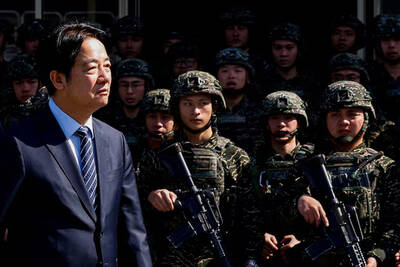Officials from the Department of Health will soon convene a meeting to look into the long unresolved issue of legalizing surrogate pregnancy, with plans to draft laws for its regulation.
At a press briefing on Nov. 20, Chinese Nationalist Party (KMT) deputy secretary-general in the legislature Chiang Hui-chen (江惠貞) said that there are more than 5,000 couples in Taiwan who wish to have a baby, but are unable to for a variety of reasons and who do not have the financial resources to go abroad to arrange a surrogacy.
“This has resulted in many cases of surrogate mothers in Taiwan offering their services under the table, outside of legal channels,” Chiang said.
She demanded that the health department focus on the issue and present working proposals and draft regulations in the near future.
The health department’s Bureau of Health Promotion deputy bureau chief Kung Hsien-lan (孔憲蘭) was at the press briefing and said that many countries have legalized the use of surrogate mothers. In Taiwan a meeting was convened in 2004 to discuss the issue, leading to a consensus to legalize surrogacy, but with restrictions.
Kung said because the issue involves the rights of the clients, the surrogate mother and the baby, more than 40 articles of law have been drafted, but though more than 20 different meetings have been held with domestic and international experts in the field, it had been difficult to arrive at a consensus on the draft regulations.
She added that a meeting was held in September where agreement on three points was reached, including allowing infertile clients to use surrogate mothers, providing they can supply healthy sperm and ova.
Kung said it had also been agreed at the meeting that infertile couples who could only provide either healthy sperms or ova, should also be allowed to use the service of a surrogate mother.
It was also agreed that the government should oversee the area of surrogate pregnancies to protect the rights of the clients, the surrogate mother and the baby. It should also ensure that surrogacy has no monetary compensation attached, but that financial assistance may be provided for necessary expenses.
This is to prevent surrogacy being offered for financial gain.
Kung said the health department’s position is to seek legalization of surrogacy, but that consensus from all sectors of society is needed.
Her agency will convene a meeting to discuss the issue of legalizing surrogate pregnancy and decide whether to place it within the existing Artificial Reproduction Act (人工生殖法) or draft a separate act for its regulation.
Kuo Chuan-ching (郭全慶), committee member for the Department of Legal Affairs at the Ministry of Justice, said surrogacy may result in legal identity problems, and recommended a separate act to delineate the rights and responsibilities of all parties involved.
Regarding rights protection during surrogacy cases, such as when a baby is delivered with physical deformities, Kuo said that this is within the scope of the contract between the client and the surrogate mother, and if such conditions are stated in the contract, then disputes can be avoided.

The Taipei Mass Rapid Transit (MRT) Wanda-Zhonghe Line is 81.7 percent complete, with public opening targeted for the end of 2027, New Taipei City Mayor Hou You-yi (侯友宜) said today. Surrounding roads are to be open to the public by the end of next year, Hou said during an inspection of construction progress. The 9.5km line, featuring nine underground stations and one depot, is expected to connect Chiang Kai-shek Memorial Hall Station to Chukuang Station in New Taipei City’s Jhonghe District (中和). All 18 tunnels for the line are complete, while the main structures of the stations and depot are mostly finished, he

The first global hotel Keys Selection by the Michelin Guide includes four hotels in Taiwan, Michelin announced yesterday. All four received the “Michelin One Key,” indicating guests are to experience a “very special stay” at any of the locations as the establishments are “a true gem with personality. Service always goes the extra mile, and the hotel provides much more than others in its price range.” Of the four hotels, three are located in Taipei and one in Taichung. In Taipei, the One Key accolades were awarded to the Capella Taipei, Kimpton Da An Taipei and Mandarin Oriental Taipei. Capella Taipei was described by

Minister of Economic Affairs Kung Ming-hsin (龔明鑫) yesterday said that private-sector refiners are willing to stop buying Russian naphtha should the EU ask them to, after a group of non-governmental organizations, including the Centre for Research on Energy and Clean Air (CREA), criticized the nation’s continued business with the country. While Taiwan joined the US and its Western allies in putting broad sanctions on Russia after it invaded Ukraine in 2022, it did not explicitly ban imports of naphtha, a major hard-currency earner for Russia. While state-owned firms stopped importing Russian oil in 2023, there is no restriction on private companies to

President William Lai (賴清德) is expected to announce a new advanced “all-domain” air defense system to better defend against China when he gives his keynote national day speech today, four sources familiar with the matter said. Taiwan is ramping up defense spending and modernizing its armed forces, but faces a China that has a far larger military and is adding its own advanced new weapons such as stealth fighter jets, aircraft carriers and a huge array of missiles. Lai is expected to announce the air defense system dubbed “Taiwan Dome” in his speech this morning, one of the sources said. The system